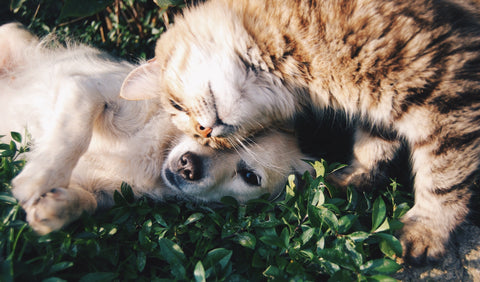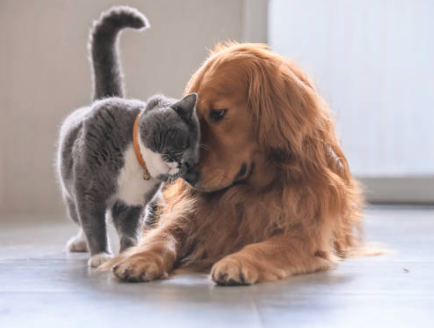Getting high with cannabis and hemp-derived psychoactive compounds offers a multitude of benefits. It can be a great way to relax after a long day of work, offers a way to enjoy yourself with friends recreationally, may help you fall asleep, improves appetite (munchies!), and much more. But what happens if your four-legged friend happens upon a forgotten gummy or laps up a bit of spilled tincture? You’ve probably seen videos on social media that portray their pets accidentally getting high and a rushed trip to the vet. Might seem funny to watch then, but what happens when it’s your fur-baby? Not quite so funny. Over 66% of Americans own at least one pet, and younger households are opting for multiple pets instead of children. The risk of accidental ingestion is a real one, and In this article, we’ll be discussing exactly what happens, why it’s dangerous, and what to do if it happens to your pet.
Why THC Is Bad For Pets

It’s no secret that chocolate is bad for pets like dogs, cats, and horses, along with grapes (raisins too!), certain nuts (macadamia) artificial sweeteners (xylitol), and OTC meds like acetaminophen and ibuprofen. But what about cannabis? According to the ASPCA, yes, marijuana and hemp-derived psychoactive cannabinoids (specifically, Delta-9 THC) are poisonous. Cannabidiol (CBD) is considered safe for pets to ingest, provided that it has been specifically formulated for pet ingestion. Check out our full lineup of pet CBD here as well as other article regarding CBD for pets here.
THC-infused edibles like gummies and baked goods contain high amounts of THC to compensate for what’s lost in digestion. Gummies and baked goods may also contain chocolate, xylitol, or other substances that may be detrimental to your pet’s health. When your pet accidentally consumes THC-infused products, you should immediately contact poison control and your vet. Simply “sleeping it off” isn’t an option; your pet needs an examination stat and may also need supportive care.
What To Look For If You Suspect Accidental Ingestion

Think your pet accidentally got into your favorite THC product? Here’s some signs to look for: lethargy/inactivity, difficulty walking straight, dilated pupils, excessive drooling, difficulty urinating, or increased sensitivity to touch, sudden movements, or sounds, there’s a strong possibility your pet is high. You may also notice some rare signs like aggression, excessively fast heart rate, slow ragged breathing, abnormal restlessness, irregular eye movements, and in extreme situations, seizures or lifelessness. Depending on the amount of THC your furry friend consumed, these symptoms may linger for as little as an hour or as long as several days. The good news is that death from THC consumption is extremely rare.
What To Expect When At The Vet
Your vet will be able to advise on future care, possible treatment options, and ensure peace of mind. Once you’re at the vet, it’s crucial to be as honest as possible. Let your vet know the product type consumed, how much you suspect was ingested, and how long ago the ingestion occurred. Vets are there to help and can act quickly to ensure the recovery is as swift and smooth as possible, without unnecessary or excessive (and often expensive!) testing.

Some of the lab testing for your pet may involve X-rays, depending on what your pet got ahold of. They’ll also get bloodwork done to determine a general timeframe of how long the product has been in their system, which can also rule out any other pre-existing conditions and can help monitor your pet’s response to additional supportive care. Urine tests for your pet aren’t often an option, as pet urine contains compounds that humans do not and can therefore be difficult to ascertain accuracy. Aside from false negatives, urine tests and diagnostic tests can take time to get the results back, meaning your pet will probably be back to normal by the time the tests come in.
Instead of time-consuming tests, your vet may opt to induce vomiting (only if a dangerous amount was consumed very recently and there are no other signs of the pet getting high yet). Other options include using activated charcoal, administering fluids via an IV, warming or cooling (hypothermia) therapy, and general nursing care. If your pet is showing severe signs (seizing, slowed heart rate, trembling, or agitation) due to the time elapsed since consumption, your vet may administer medication to combat that.

Final Thoughts
Cannabis is undergoing a radical change in its legal perception, meaning there is greater access to it for both medicinal and recreational purposes. Unfortunately, this means your pet has a greater chance of getting into your THC-infused products if you have them more readily available. The Pet Poison Helpline reports a 448% increase in accidental THC consumption for pets. To combat this, make sure to keep your leftover or unused products in a cool dark place. This can mean your fridge, a locked cabinet or cupboard, or tucked away safely inside a dresser drawer. If you suspect that your pet has consumed any of your THC-infused products, contact the Pet Poison Hotline (800-213-6680) or the ASPCA Animal Poison Control Center (888-426-4435) immediately.

For the rest of us who have no problem consuming various hemp-derived cannabinoids, we here at Native Extracts have a delightful assortment of products ready for human consumption! Check out our exquisite collection of Delta-8 THC, Farm Bill Compliant Delta-9 THC, HHC, and THC-O. We carry vegan gummies, easy-to-swallow softgels, silky tinctures, disposable vapes, and screw-in vape cartridges. All of our products have been tested by third-party independent labs to ensure purity and potency. You can view the results by scanning the QR code printed on the product packaging or by clicking on the embedded link in each product’s description on our website. If you have any questions regarding anything in this article or regarding cannabis in general, feel free to reach out to us! Our team of cannabis specialists would be thrilled to help you understand some of the nuances of the weed and hemp industry. In our next article, we’ll be exploring why lab tests (called CoA’s) are so important in this industry. We look forward to seeing you there!


